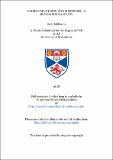Files in this item
George Matheson and mysticism : a biographical study
Item metadata
| dc.contributor.advisor | Bradley, Ian | |
| dc.contributor.author | McKenna, Scott | |
| dc.coverage.spatial | 254 p. | en_US |
| dc.date.accessioned | 2018-07-19T13:21:20Z | |
| dc.date.available | 2018-07-19T13:21:20Z | |
| dc.date.issued | 2018 | |
| dc.identifier.uri | https://hdl.handle.net/10023/15589 | |
| dc.description.abstract | George Matheson, a Minister of Word and Sacrament in the Church of Scotland in the late Victorian period, was a mystic. Mysticism is not commonly associated with Scottish Presbyterian ministers who stand in the Calvinist branch of the Reformed tradition. In this thesis I discuss the extent to which Mathesonian theology reflects mystical theology, generally understood, and more specifically Hegelian mysticism. Drawing on a significant number of Matheson’s writings, I have created a succession of foci which encapsulate Matheson’s mystical thought: union with God, the inner life, immortality of the soul, and self-forgetfulness. After a brief biographical chapter, I discuss Matheson’s crisis of faith, which he suffered in the first year or two following his ordination, and his spiritual recovery. In chapter three, I discuss Matheson’s contribution to the debate between science and religion and specifically his engagement with the doctrine of transcendence proposed by Herbert spencer. In the remaining chapters, I discuss the four central themes of Matheson’s work: union with God, the inner life and immortality of the soul, and self-forgetfulness (kenotic theology). In common with other mystics, Matheson’s sense of union or oneness with the Divine is a central characteristic of his work. Christ in us, Christ in you, was the lived experience which moulded Matheson’s spiritual life, theology and meditations. In chapter 5 I discuss Matheson’s focus on the inner life, the importance of silence and solitude, and immortality of the soul. Matheson’s imaginative engagement with Scripture was shaped by his physical blindness. The darkness which enveloped his existence was the darkness in which he saw and felt the mystery of God. From inescapable darkness, he saw God in all things. In the final chapter I discuss Matheson’s kenotic theology. Matheson understood death and suffering, like eternal life, to be integral to the Divine. | en_US |
| dc.language.iso | en | en_US |
| dc.publisher | University of St Andrews | |
| dc.title | George Matheson and mysticism : a biographical study | en_US |
| dc.type | Thesis | en_US |
| dc.contributor.sponsor | University of St Andrews | en_US |
| dc.type.qualificationlevel | Doctoral | en_US |
| dc.type.qualificationname | PhD Doctor of Philosophy | en_US |
| dc.publisher.institution | The University of St Andrews | en_US |
This item appears in the following Collection(s)
Items in the St Andrews Research Repository are protected by copyright, with all rights reserved, unless otherwise indicated.

